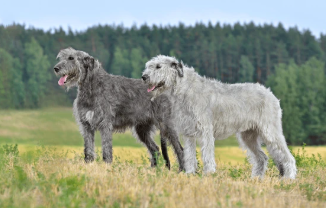
Irish Wolfhound: The Majestic and Noble Giant of the Dog World
When it comes to large dog breeds, few are as impressive as the Irish Wolfhound. Known for their towering size, gentle nature, and deep historical roots, these dogs have been revered for centuries. The Irish Wolfhound is not just a breed; it’s a symbol of strength, loyalty, and history. Whether you’re considering adopting an Irish Wolfhound or simply want to learn more about this majestic breed, you’re in the right place. In this blog post, we’ll explore everything from the Irish Wolfhound’s history to its care requirements, training needs, and personality traits.
What is an Irish Wolfhound?
The Irish Wolfhound is one of the tallest dog breeds in the world, with some individuals standing over 32 inches tall at the shoulder. Despite their imposing size, these dogs are often described as “gentle giants.” Their strong build and impressive stature can be intimidating, but their demeanor is calm, affectionate, and good-natured. The Irish Wolfhound was originally bred to hunt large game, such as wolves and elk, in the rugged Irish countryside. Today, these noble dogs are popular as family pets and companions, thanks to their friendly temperament and devotion to their families.
Typically, Irish Wolfhounds have a wiry, rough coat that comes in a variety of colors, including gray, brindle, red, black, and white. They are known for their graceful movement, especially considering their large size. These dogs carry themselves with a quiet dignity that perfectly complements their gentle personalities.
A Brief History of the Irish Wolfhound
The Irish Wolfhound’s history stretches back over 2,000 years, making them one of the oldest breeds in the world. These dogs were originally used for hunting large game in Ireland, particularly wolves, which were once plentiful in the country. The breed’s ancestors were thought to have been brought to Ireland by the Celts from the Mediterranean region, where they may have been bred with local dogs to produce the large, strong dogs we know today.
In the Middle Ages, the Irish Wolfhound was highly prized by the Irish nobility. These dogs were not only admired for their ability to hunt and protect but were also considered a symbol of status and strength. They were even gifted to kings and rulers in Ireland and other parts of Europe as a sign of respect.
However, by the 18th century, the Irish Wolfhound nearly faced extinction due to the decline of wolf populations in Ireland and the popularity of other breeds. Thankfully, dedicated breeders in the 19th century revived the breed, and the Irish Wolfhound slowly regained its place as one of the most majestic and loved breeds in the world.
Personality Traits: Gentle Giants with a Big Heart
Irish Wolfhounds are often referred to as “gentle giants” because of their calm and affectionate nature. Despite their impressive size, they are typically friendly, loyal, and great with families. These dogs are known for their loving disposition, and they tend to bond closely with their human companions. Their gentle demeanor makes them excellent pets for households with children, and their patience is often remarkable when interacting with younger members of the family.
While Irish Wolfhounds may have been bred for hunting, they are not aggressive dogs. They are generally peaceful and affectionate toward people and other animals, although they may have a strong prey drive due to their history as hunters. This means they might be inclined to chase small animals like squirrels or rabbits, but with proper training and socialization, they can live harmoniously with other pets.
One of the most defining characteristics of the Irish Wolfhound is its loyalty. These dogs are extremely devoted to their families and enjoy being part of the household. They are usually not overly energetic indoors and are content to curl up on the couch or rest next to their owners. However, they do need regular outdoor exercise and playtime to keep them healthy and happy.
Training an Irish Wolfhound: Calm but Strong-Willed
Training an Irish Wolfhound can be a rewarding experience, but it’s important to keep in mind their large size and independent nature. These dogs are intelligent and can learn commands quickly, but they also have a bit of an independent streak. Due to their hunting background, Irish Wolfhounds can sometimes be stubborn, especially when it comes to responding to commands that don’t interest them.
Positive reinforcement methods work best for this breed, as they respond well to treats, praise, and affection. Early socialization is key to ensuring that Irish Wolfhounds grow up to be well-behaved and friendly toward other animals and people. Training should be consistent, patient, and focused on making learning enjoyable for your dog.
Due to their size, it’s important to ensure that your Irish Wolfhound understands basic commands like “sit,” “stay,” and “come” for safety, especially when out for walks or in public areas. Because of their natural instincts as hunters, they might become distracted by small animals, and having reliable recall can prevent accidents.
Exercise Needs: Active, But Not Overly Demanding
Though they may appear imposing, Irish Wolfhounds are not hyperactive dogs. However, due to their large size, they do require regular exercise to maintain their health. Daily walks and opportunities to stretch their legs in a secure, fenced yard are important for keeping them fit. Despite their calm demeanor, they need a good amount of physical activity to stay in good shape and prevent boredom.
It’s important to avoid overly strenuous exercise, especially when they are young, as their large bones and joints can be prone to injuries if they are pushed too hard. As puppies, Irish Wolfhounds should not be overexerted, and their exercise routines should be focused on gradual development rather than intense activity. When they reach adulthood, they can handle more vigorous activities like long walks or light jogging, but care should be taken to avoid strain on their joints.
Swimming is an excellent form of low-impact exercise for Irish Wolfhounds, as it allows them to use their muscles without putting too much stress on their bones and joints.
Grooming the Irish Wolfhound: Minimal Maintenance
Despite their large size, Irish Wolfhounds are relatively easy to groom. Their wiry coats require occasional brushing to prevent tangles and mats, but they are not heavy shedders. Regular brushing once or twice a week is usually enough to keep their coats looking neat. They do shed lightly throughout the year, with slightly increased shedding during seasonal changes, but this is manageable compared to other breeds.
Irish Wolfhounds do not have an overly thick undercoat, which helps keep their grooming routine simple. Bathing should only be done as necessary, typically when they become dirty or after outdoor adventures. Their nails should also be trimmed regularly to prevent discomfort or injury, especially since these dogs are often large and active.
Their ears, eyes, and teeth should be checked regularly for signs of infection or irritation. Like any dog breed, maintaining good hygiene and health practices will help your Irish Wolfhound live a long and healthy life.
Health Considerations: Keeping Your Irish Wolfhound Healthy
As a giant breed, Irish Wolfhounds are more prone to certain health issues compared to smaller dogs. Some common health concerns for this breed include:
- Hip Dysplasia: This is a condition where the hip joint doesn’t develop properly, which can lead to arthritis and pain. Maintaining a healthy weight and providing moderate exercise can help reduce the risk of hip dysplasia.
- Bloat (Gastric Dilatation-Volvulus): Large breeds like the Irish Wolfhound are more susceptible to bloat, a life-threatening condition where the stomach twists. This condition requires immediate veterinary attention.
- Heart Disease: Irish Wolfhounds may be at risk for heart conditions such as dilated cardiomyopathy (DCM). Regular check-ups with a vet are essential to catch any early signs of heart problems.
Due to their large size and relatively short lifespan (typically 6-8 years), it’s important to maintain regular veterinary visits and proper nutrition to ensure the longevity and well-being of your Irish Wolfhound.
Is the Irish Wolfhound the Right Dog for You?
Irish Wolfhounds are ideal for families and individuals who are ready for a gentle giant. They are loving, loyal, and affectionate companions, perfect for people looking for a calm, friendly dog that enjoys being part of the family. However, due to their size and unique health concerns, potential owners should be prepared to provide proper training, socialization, and regular veterinary care.
These dogs are best suited for families with a spacious home and yard, where they can have room to move around. With their majestic appearance, gentle temperament, and rich history, an Irish Wolfhound can bring a sense of nobility and companionship to your life.


Leave a Reply